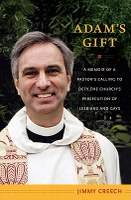By Dawn Baumgartner Vaughan, Durham Herald-Sun
Jimmy Creech spent his career as an ordained United Methodist pastor until the church took his credentials away as punishment for conducting same sex commitment ceremonies in Omaha and Chapel Hill.
He was not convicted at a trial in Nebraska in 1998, but he lost his church assignment and the stage was set for a second trial in 1999 after he officiated a ceremony at United Church of Chapel Hill. Since then he has been a leader of LGBT justice issues, retired to Raleigh and travels the country speaking. He also has written an account of the upheaval, “Adam’s Gift: A Memoir of a Pastor’s Calling to Defy the Church’s Persecution of Lesbians and Gays.” He’ll speak about it Saturday at the Durham County Library Main Branch downtown.
Creech’s life changed after, as the title notes, a parishioner named “Adam” first questioned him about the United Methodist Church’s stance on homosexuality as “incompatible with Christian teaching” while Creech was pastoring a Warsaw, N.C., church in 1984. Married, he hadn’t thought too much about it. In a chapter called “Reorientation,” Creech writes about what he learned researching Biblical passages and societal history of homosexuality. He wrote how books changed his mind about homosexuality, and people like Adam, who left the church rejected, changed Creech’s heart.
He stepped off the curb into the fray, literally, while pastor of Fairmont United Methodist Church in Raleigh, near N.C. State. Creech walked in the 1988 Pride March as part of the Raleigh Religious Network for Gay and Lesbian Equality. It started a fracture in Fairmont church. The church eventually asked the bishop for a new pastor, and Creech’s next appointment was taken away. He worked at the N.C. Council of Churches before First United Methodist Church in Omaha, Neb., asked him to come. In “Adam’s Gift,” Creech writes about how he shared all the information about his ministry and his LBGT advocacy, yet it was not shared with everyone at the church. So in Nebraska, too, Creech led a divided church.
Creech details the UMC trial there after he officiated a ceremony between two women at the church. Though he was acquitted, the bishop still took away his church assignment and Creech returned to Raleigh. Not until a second trial, after officiating the men’s ceremony at United Church of Chapel Hill, did the United Methodist Church defrock him. Creech was no longer allowed to serve in the UMC as a minister, but he did not leave the UMC.
Creech said the recent inclusion of gay and lesbian clergy in the Evangelical Lutheran Church in America and Presbyterian Church (USA) might seem like sudden changes, but they weren’t. It took time to grow support and get the votes, he said.
“That’s happening in the United Methodist Church as well,” he said, though differently because UMC polity is different. Methodists vote by conference, and the Southeast and South Central regions of the U.S. are resistant, Creech said. He doesn’t use the word “conservative,” because there are different kinds of conservative — religious, political — and there are conservatives who want inclusion, he said. Conferences in the Southwest are more open to the idea, but have much fewer delegates to the General Conference of the United Methodist Church, the governing body, he said.
Creech is a 1970 graduate of Duke Divinity School. He’s spoken there a few times for a LGBT group called Sacred Worth, however, he thinks the administration and faculty at Duke Divinity have not been helpful in giving leadership to change policies of the UMC.
“It contributes more to the status quo,” he said. “I’m disappointed as alumni — I had hoped they’d give leadership to welcome all.”
Creech thinks change is going to come in the United Methodist Church.
“It’s going to take a long time. The process required in the social justice movement is slow,” Creech said. Some of it will change with the generations, he said.
“Ten years down the road, we’ll see a shift to them being included,” Creech said, but that doesn’t mean today they should just accept the current status.
“We need to educate about the damage the church is doing … when they teach hate and bigotry. There’s a hypocrisy there and lack of integrity,” Creech said. “Including lesbian, gay, bisexual and transgender people in the church and society is very important. It’s a justice issues and about the integrity of the church, being able to speak authentically about God’s love.”
For those impatient for change within the UMC when other mainline Protestant denominations are already inclusive, Creech doesn’t discourage them from wanting to find a church where they are fully accepted.
“I’m committed to stay because I’m willing to continue the fight, continue the struggle. It’s my way of loving the church,” he said.

